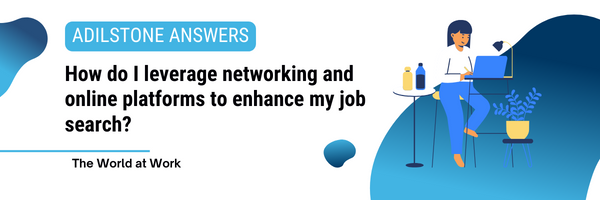How do I leverage networking and online platforms to enhance my job search? | Adilstone Answers

Leveraging networking and online platforms is a crucial aspect of enhancing your job search in today's digital age. Here are some tips to help you make the most of these tools:
1. LinkedIn Profile Optimization:
- Create a professional and complete LinkedIn profile with a clear and professional photo, a compelling headline, and a well-written summary.
- List your skills, experiences, and achievements. Use keywords relevant to your industry to enhance searchability.
- Request recommendations from colleagues, supervisors, or peers to add credibility to your profile.
2. Expand Your Network:
- Connect with professionals in your industry, alumni, colleagues, and friends on LinkedIn.
- Join relevant LinkedIn groups and participate in discussions to showcase your expertise and expand your network.
3. Job Search Platforms:
- Use popular job search platforms like LinkedIn Jobs, Indeed, Glassdoor, and others to find and apply for jobs.
- Set up job alerts based on your preferences to receive notifications about relevant opportunities.
4. Online Professional Communities:
- Participate in industry-specific forums, discussion groups, or online communities. Platforms like Reddit, Quora, and specialized forums can be valuable for networking and learning about job opportunities.
5. Personal Branding:
- Share your knowledge and expertise through blog posts, articles, or by participating in discussions on platforms like Medium or industry-specific forums.
- Showcase your work and achievements through an online portfolio or personal website.
6. Informational Interviews:
- Reach out to professionals in your desired field for informational interviews. This can provide insights into the industry, company culture, and potential job opportunities.
7. Attend Virtual Events:
- Participate in online conferences, webinars, and virtual events related to your industry. This is an excellent way to network with professionals and stay updated on industry trends.
8. Utilize Twitter and Other Social Media:
- Follow companies, industry leaders, and relevant hashtags on Twitter.
- Engage in conversations, share relevant content, and use Twitter as a platform to connect with professionals in your field.
9. Online Learning Platforms:
- Enhance your skills and stay competitive by taking courses on platforms like Coursera, Udacity, or LinkedIn Learning. Highlight your certifications on your LinkedIn profile.
10. Professional Associations:
- Join professional associations related to your industry. Many of these associations have online platforms where you can connect with other members and access job boards.
Remember to be authentic, professional, and strategic in your online interactions. Building a strong online presence and leveraging networking opportunities can significantly enhance your job search efforts.
What burning questions do you have? Let us know by commenting below and we'll answer your questions in our upcoming editions!
Related Content




Comments